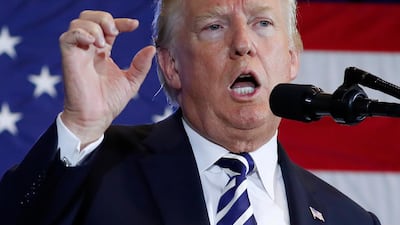President Donald Trump escalated his attacks on Attorney General Jeff Sessions on Monday, suggesting the Department of Justice put Republicans in midterm jeopardy with recent indictments of two GOP congressmen.
In his latest broadside against the Justice Department's traditional independence, Mr Trump tweeted that “Obama era investigations, of two very popular Republican Congressmen were brought to a well publicized charge, just ahead of the Mid-Terms, by the Jeff Sessions Justice Department”.
He said: “Two easy wins now in doubt because there is not enough time. Good job Jeff......”
Another blow in his long-running feud with Mr Sessions, the president's complaint fits with his pattern of viewing the Department of Justice less as a law enforcement agency and more as one that should do his political bidding. Typically, the agency prides itself on independence from political influence, and investigators are never supposed to take into account the political affiliations of the people they investigate.
_______________
Read more:
White House counsel Don McGahn latest to head for the exit
After a series of devastating blows, the legal walls are closing in on Trump
Trump launches fresh attacks on his attorney general
_______________
Mr Trump, who did not address the specifics of the charges, did not name the Republicans. But he was apparently referring to the first two Republicans to endorse him in the GOP presidential primaries. Both were indicted on separate charges last month: Duncan Hunter, a congressman from California, on charges that included spending campaign funds for personal expenses, and Chris Collins, a congressman from New York, on insider trading. Both have proclaimed their innocence.
The Hunter investigation began in June 2016, according to the indictment. It was not clear when the investigation into Collins began. The conspiracy alleged in his indictment supposedly began in 2017, though he was also under investigation by congressional ethics officials.
Mr Hunter has not exited his race, while Mr Collins ended his re-election bid days after his indictment. Both seats appear likely to remain in GOP hands, but the charges have raised Democratic hopes.
A spokeswoman for Mr Sessions declined to comment, and the White House did not immediately respond to a request for comment.
Mr Trump did not have any public events Monday. He briefly exited the White House to a waiting motorcade, but then went back inside without going anywhere.
He has previously pressed Mr Sessions to investigate his perceived enemies and has accused him of failing to take control of the Justice Department. Mr Trump has also repeatedly complained publicly and privately over Mr Sessions's decision to recuse himself from the federal investigation into possible collusion between the Trump campaign and Russia.
Some of the issues Mr Trump has raised have either already been examined or are being investigated.
The tension between the pair boiled over recently with Mr Sessions punching back, saying that he and his department "will not be improperly influenced by political considerations". Still, he has made clear to associates that he has no intention of leaving his job voluntarily despite Mr Trump's constant criticism.
Allies, including Republican members of Congress, have long advised Mr Trump that firing Mr Sessions — especially before the November midterm elections — would be deeply damaging to the party. But some have indicated that he may make a change after the elections.
"I think there will come a time, sooner rather than later, where it will be time to have a new face and a fresh voice at the Department of Justice," Lindsey Graham, a senator from South Carolina, told reporters recently.

